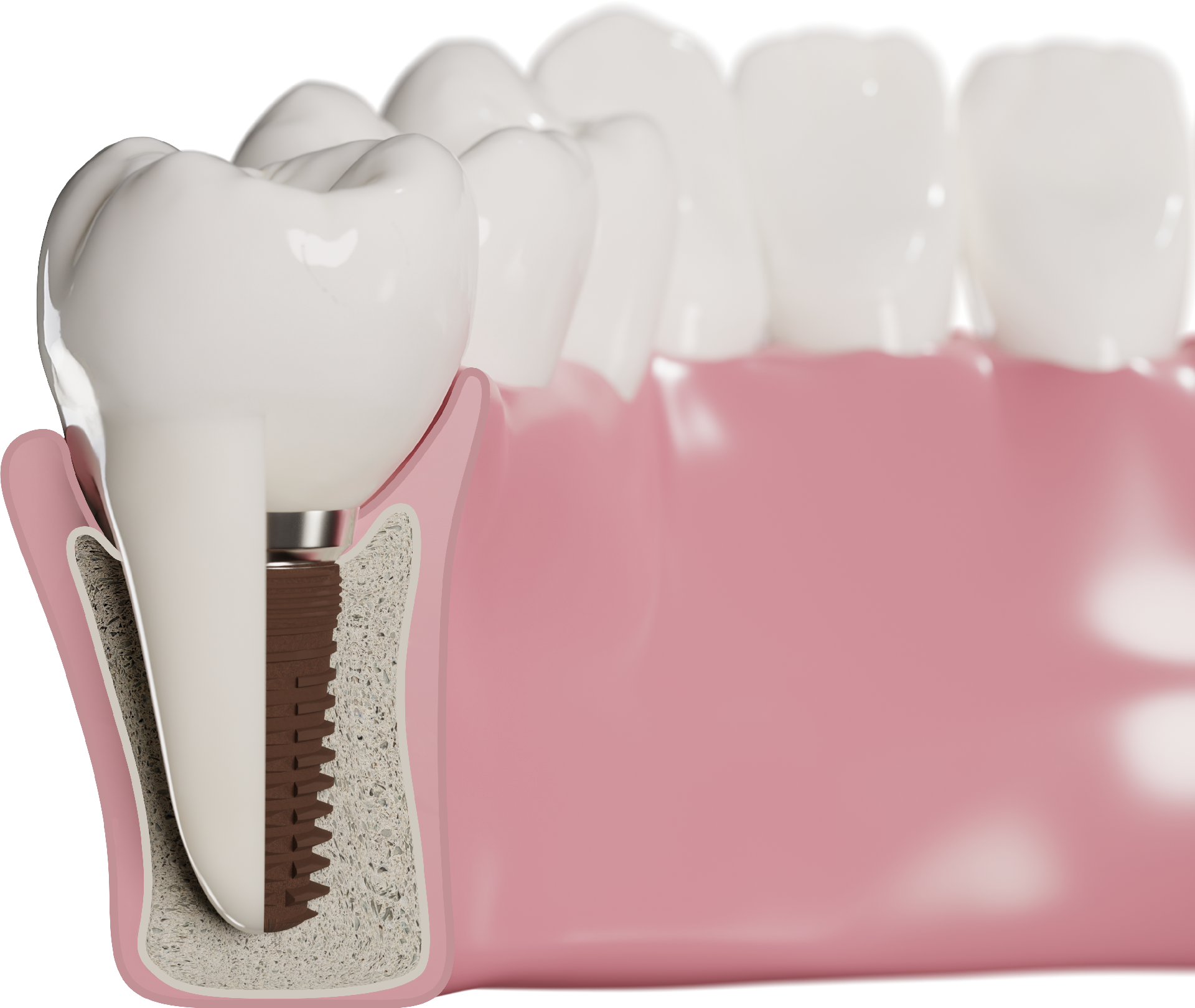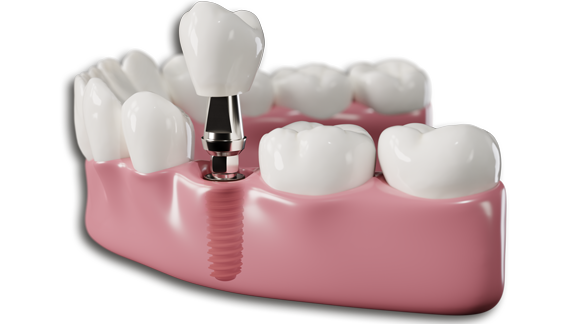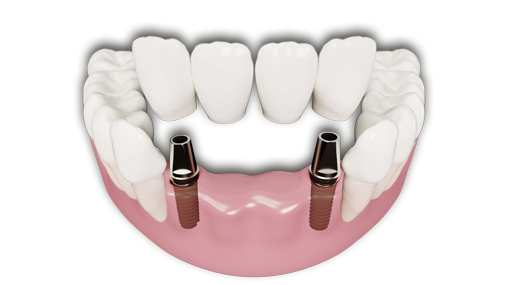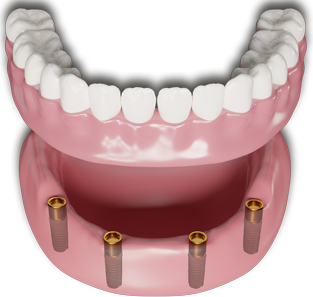Your smile.
Our implant.
MCI dental implants
Quality of life, self-confidence, enjoyment
A bright, carefree smile often says more than a thousand words. Anyone who suffers tooth loss wants a replacement that restores the natural aesthetics, function and safety of the teeth.
The quicker you act in the event of a loss, the healthier it will be for your jawbone. With a dental implant you maintain the important medical function of healthy teeth. Because of the natural chewing forces, the jawbone is evenly loaded and is therefore preserved. If this load is lost through tooth loss, bone loss inevitably occurs. Like natural teeth, implants maintain the functional chewing load on the jawbone and offer an optimal alternative to natural teeth. This is proven by many years of scientific research and clinical experience.
With MCI dental implants, you can talk, laugh, and continue to bite firmly. In short – enjoy life with confidence again.
What is a dental implant and how does it work?
Product safety, comfort, tolerability
A dental implant is an artificial tooth root that is inserted into the jawbone. The dental implant is made of titanium, which is characterized by its body compatibility and long durability. Dental implants are a recognized treatment alternative to meet the patient's desire for joy in life, self-confidence and enjoyment.
Your MCI implant is inserted into the jawbone under local anesthesia and, after an individual healing period, serves as a stable pillar for attaching dentures in the form of crowns, bridges or prostheses.
Dental implants are often root-shaped and usually have a rough surface to improve healing and a firm connection to the jawbone. Regardless of the patient's age, dental implants can be inserted in the upper and lower jaw. Through a natural chewing distribution in the jawbone, implants ensure that the natural bone loss that otherwise inevitably occurs after tooth loss is effectively prevented.
For every implantological treatment there are important requirements that must be observed and fulfilled (e.g. regular prevention and care). Please take advantage of your individual consultation with your dentist.

Areas of application and therapy options
Implantology offers optimal solutions for your individual situation.
There are various options for closing tooth gaps.
A distinction can be made between the following situations:
A tooth is missing
An implant has the advantage over a bridge that additional, healthy neighboring teeth do not need to be ground. When a tooth is missing, appearance and speech are particularly affected. In contrast to the bridge, the healthy neighboring teeth remain completely untouched during single-tooth implantation.


Several teeth are missing
If several teeth are missing next to each other, it is possible to close the gap using an implant-supported bridge construction. The implants can be used as additional “pillars” for secure attachment of fixed dentures. Neighboring teeth are fully preserved.

Many or all of the teeth are missing
Partial or full dentures (removable or fixed) have a firm hold on several implants. Even with a toothless jaw, implants ensure a perfect appearance and an even load on the jawbone. This strengthens the bone and provides a secure hold for your prosthesis.

How does treatment with implants work?
Your treatment can be divided into five steps. From the first consultation to the insertion of your dentures, everything is standardized but still individually tailored to your wishes.
1.
Step
Examination and advice
You will receive a diagnosis and treatment suggestion based on various X-ray options from your doctor.
2.
Step
Possible preparatory treatments
- Gum pockets and tooth decay
- Orthodontic misalignments
- Bone formation with inadequate bone quality and quantity
- If necessary, tooth extractions
3.
Step
implantation
Under local anesthesia, after a small incision through the gums, special instruments are used to drill a hole in the jawbone and the corresponding implant is inserted. Sedation is also possible if desired.
4.
Step
Healing phase
Over the following weeks, the implant grows firmly into the bone (so-called osseointegration). The healing phase usually lasts 3-6 months. For this
Temporary dentures are possible during the transition period.
5.
Step
Integration of dentures/care
The dentures made specifically for you are attached to the implant. Your daily dental care, regular professional teeth cleaning, as well as fixed check-up appointments ensure long-term results.
The most important implant information in brief
How long does an implant last?
The material titanium has the property of not aging. With good oral hygiene, regular check-ups and appropriate quality and quantity of jawbone, MCI dental implants can
last a lifetime.
Is the treatment painful?
The insertion of an implant is carried out under local anesthesia and is generally a comparatively small and painless surgical procedure. Basically, you will be free of symptoms the next day and can resume your everyday life. As with any surgical procedure, mild pain or mild swelling may still occur after implantation.
What is the success rate?
According to studies on this topic, 98% implants are still in the jaw after 10 years and are therefore an optimal dental replacement. Factors such as poor oral hygiene, alcohol and drug consumption affect success.
How long does treatment take?
You will discuss the best treatment option for you with your dentist. Accordingly, the duration of treatment varies from patient to patient. As a rule, you can expect a treatment period of 3-12 months. The duration depends on the implant area (upper jaw or lower jaw), the bone quality and the individual healing process.
How compatible is my MCI dental implant?
Like many other prostheses or implants that remain in the body, MCI implants are made of titanium. This material is characterized by very good compatibility. In very rare cases, patients may experience intolerance. We offer you the opportunity to use a titanium plate to test whether there is an intolerance.
What risks can occur during the operation?
Dental implantation is a minor surgical procedure. Due to the technological possibilities of planning implants and thus eliminating potential risks, an implantation is a procedure with manageable risks. Complications may occur during surgery. Your treating doctor will explain this to you separately.
How many implants make sense?
Implants, like natural tooth roots, are intended to transfer the forces that arise when chewing to the jawbone. The more missing teeth that can be replaced with implants, the better for chewing function and the bone.
How do I properly care for my dental implants?
Perfect oral hygiene is the most important prerequisite for long-term successful implantation. The transition between the implant and the gums in particular must remain free of bacterial plaque. This often requires special cleaning techniques (dental floss, interdental brush). Regular professional teeth cleaning (PZR) is also essential.
What requirements do you have to meet to be able to receive a dental implant?
Today, almost every adult patient can be successfully treated with dental implants. The prerequisite for a successful implantation is good general health, good oral hygiene and freedom from plaque. There should be no serious underlying illnesses, alcohol or drug addiction. It is also important to have sufficient bone mass and density.
My bone supply is not sufficient – can I still receive a dental implant?
Yes, you can still get a dental implant. The jawbone does not always have sufficient volume to provide a firm hold for the implant. In many cases, bone can be built using the body's own material or suitable substitutes.
Our guarantee promise!
Our 10 year guarantee for your smile
MCI dental implants represent a long-term investment in your health. Our products meet the highest standards of safety and precision so that you feel more attractive and vital again. Every individual implant goes through an analysis after it has been manufactured. It is then packaged sterile and identified by the batch number. To develop and optimize our products, we are in constant dialogue with experts from surgery, prosthetics and science. All production processes and products are subject to constant quality control.
Your quality of life is important to us.
With a new smile you radiate vitality and look confidently into the future.

MCI implants – at home in the world
Tested medical devices
When developing and producing our products, we rely on outstanding product quality that you can rely on. You can be sure that this is a tested medical product of the highest purity, precision and quality.

Implants from the Lower Rhine
Medical Consult Implants GmbH is a specialized company in dental implantology with its headquarters in Rheinberg on the Lower Rhine. Our products Made in Germany impress with guaranteed tested quality according to the highest standards.
Availability in over 50 countries
Wherever you go, MCI dental implant treatment and prosthetic care is currently available in over 50 countries.

